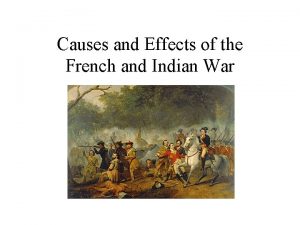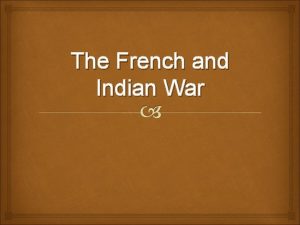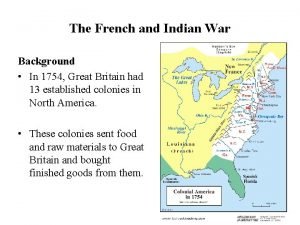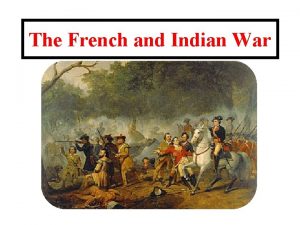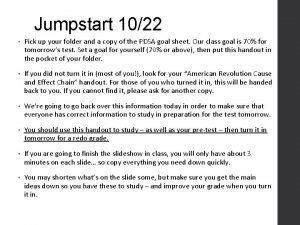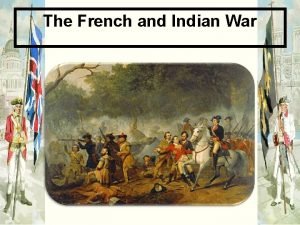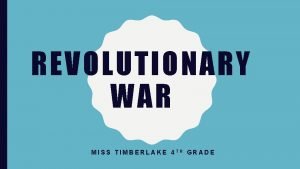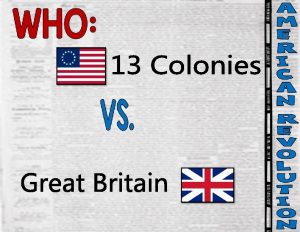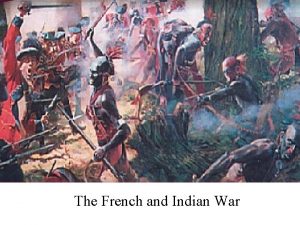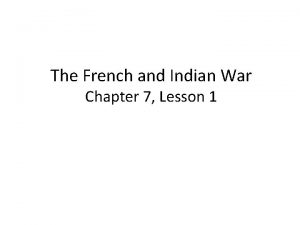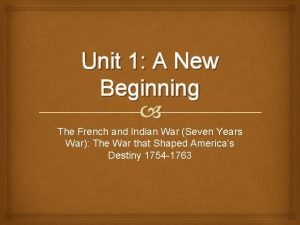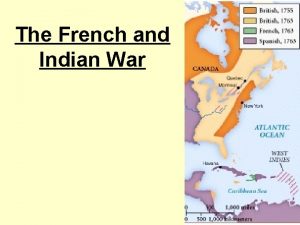The French and Indian War Competing European Claims













- Slides: 13

The French and Indian War

Competing European Claims n n In the middle of the 18 th century, France and England had competing claims for land in North America. The French held trapping and trade routes in the Ohio Valley. The English colonies were encroaching on French territory are the population grew. They also competed over trade issues with the Native Americans in the disputed region.

Competing European Claims

The Battle of Fort Necessity n n Young George Washington n The French set up forts along the Appalachian Range to protect their fur trading interests. Some of these forts conflicted with English claims. Virginia Governor Dinwiddie dispatched a young George Washington in 1754 to deliver a protest to the French at Fort Duquesne (site of present-day Pittsburgh). This protest was ignored. Washington’s small force lost a battle to the French and he was sent back to Virginia with a warning for the British. This action provoked open war between France and Britain.

The Albany Congress n n n "Join or Die" (1754) published by Franklin is considered the first political cartoon of the colonies. n The colonies sent delegates to Albany to discuss strategy for common defense and Indian policy. They approved a document written by Benjamin Franklin promoting a substructure of government below British authority to govern the colonies. The council would be comprised of elected representatives from each colony and headed by a President-General appointed by the crown. The colonies were not ready for political union and it is unlikely that the British government would have supported the plan.

From the Constitution (1787) From the Albany Plan of Union (1754) n 9. That the assent of the President-General be requisite to all acts of the Grand Council, and that it be his office and duty to cause them to be carried into execution. n “[the President]…he shall take care that the laws be faithfully executed…” n 10. That the President-General, with the advice of the Grand Council, hold or direct all Indian treaties… and make peace or declare war with Indian nations. n “[the President]…shall have power, by and with the advice and consent of the Senate, to make treaties, provided two thirds of the Senators present concur…” n 11. That they make such laws as they judge necessary for regulating all Indian trade. … n “[Congress will] regulate Commerce with foreign Nations, and among the several States, and with the Indian Tribes…” n 15. That they raise and pay soldiers and build forts for the defence of any of the Colonies… n “[Congress will] raise and support Armies…To provide and maintain a Navy…” n 16. That for these purposes they have power to make laws, and lay and levy such general duties, imposts, or taxes… n “The Congress shall have Power To lay and collect Taxes, Duties, Imposts and Excises…”

Braddock’s Defeat n n n In July 1755, the British sent a force from Virginia to attack Fort Duquesne. The heavy force was defeated by the smaller French force and their Native American allies. Both the British commander, Braddock, and the French commander Beaujeu, were killed. 23 year old George Washington won accolades for rallying the defeated British and preventing the battle from turning into a rout. The first two years of fighting were characterized by humiliating defeats for the British.

Fortunes Reverse n n In 1757, expansion advocate William Pitt became the British Prime Minister and vowed to lead Britain to victory. Pitt took out substantial loans to pay for weapons and ships and pledged to pay the costs of the war if English colonists did most of the fighting in North America • General Wolfe defeated the French under General Montcalm at Quebec City in October 1759, effectively guaranteeing the end of New France • British Navy attacks also took several French islands in the Caribbean

The Treaty of Paris n n The 1763 Treaty of Paris ended the French and Indian War. The French transferred its claims west of the Mississippi to Spain and ceded its territory east of the Mississippi to the British.

Pontiac's Rebellion n n Native Americans quickly grew disenchanted with the British. The British exhibited little cultural sensitivity, traded unfairly, and failed to stop encroachments on Indian land. This unrest culminated in a rebellion by Pontiac, a Native American leader who united various tribes with the goal of expelling the British. The uprising lasted from 1763 to 1766. Massacres and atrocities occurred on both sides— most notably, British General Jeffrey Amherst gave the Native Americans blankets infested with smallpox.

Chief Pontiac: Address to Ottawa, Huron, and Pottawatomie Indians (May 5, 1763) n “It is important … that we exterminate from our lands this nation which seeks only to destroy us. You see as well as I do that we can no longer supply our needs, as we have done from our brothers, the French. The English sells us goods twice as dear as the French do, and their goods do not last. … When I go to see the English commander and say to him that some of our comrades are dead, instead of bewailing their death, as our French brothers do, he laughs at me and at you. If I ask for anything for our sick, he refuses with the reply that he has no use for us. …

The Royal Proclamation of 1763 n n n Violent incidents such as Pontiac's Rebellion prompted the English crown to attempt to mandate an end to encroachments on territory promised to the Indians. Settlers were not to establish themselves west of the “Proclamation Line. ” The effort was unsuccessful and is viewed by many to be a leading cause of the Revolutionary War.

The Burden of Empire n n n Britain now faced the challenge of paying for its victory; the British assumed that American colonists should pay for the costs of the war (Pitt was now out of power) War debt amounted to 132 million pounds sterling, interest alone was larger than the entire colonial war debt of 2 million pounds. Britain also had to pay for maintaining over 10, 000 troops in North America, which amounted to 440 million pounds annually Americans felt burdened by debts owed to British merchants and moneylenders and believed that they had been misled with regard to paying for the war British citizens lacked sympathy – they paid taxes to the British government that were on average 8 times as much as
 Causes and effects of the french and indian war
Causes and effects of the french and indian war Where did the french and indian war take place
Where did the french and indian war take place What caused the french and indian war
What caused the french and indian war Causes of french and indian war
Causes of french and indian war French and indian war summary
French and indian war summary French and indian war
French and indian war Brainpop french and indian war
Brainpop french and indian war Who was in debt after the french and indian war
Who was in debt after the french and indian war French and indian war
French and indian war North america 1754
North america 1754 French and indian war
French and indian war French and indian war
French and indian war French for new beginning
French for new beginning French and indian war
French and indian war
